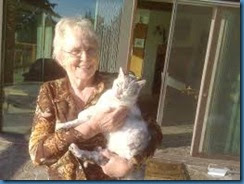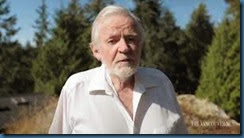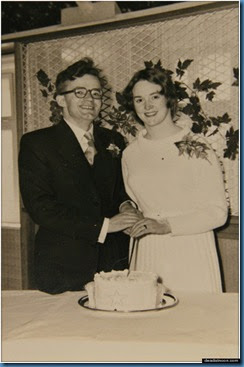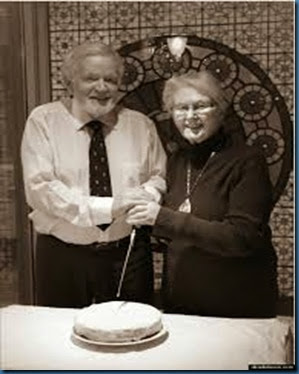
Thời báo Canada - Một phụ nữ cư dân tỉnh bang British Columbie được chẩn đoán mắc bệnh mất trí nhớ cách đây 3 năm đã tự
kết thúc cuộc đời, sau khi công bố một bức thư ngỏ trên mạng trực tuyến, với hy vọng sẽ khởi động lại cuộc tranh luận về vấn đề trợ tử ở Canada.
Trong thư đăng trên blog cá nhân www.deadatnoon.com. bà Gillian Bennett ,84 tuổi , đã nêu lý do đưa đến quyết định tự tử sau khi đã tham khảo với ý kiến của gia đình và bạn bè.
Bà Gillian Bennett viết,”Tôi có thể kéo đài đời sống thêm 10 năm nữa ,nhưng mỗi năm sẽ tốn kém 475,000 đô la tiền thuế của người dân Canada” … (1)
Bà Gillian Bennett đã uống thuốc tự sát vào trưa thứ hai tuần qua.

Chồng bà, ông Jonathan Bennett đã chứng kiến giây phút lià đời của người vợ chung sống từ 1954 đến nay,tuy nhiên không có hành vi trợ tử.
Hôm thứ Tư 20/8 ,gia đình Bennett nói với thông tấn cbc rằng họ ủng hộ quyết đinh của bà Gillian Bennett.
Ông Jonathan Bennett cho biết vợ ông đả chuẩn bị các loại thuốc , nằm trên một tấm nệm ở ngoài vườn, nơi bà có thể nhìn lên vách núi đá, tại tư gia toạ lạc đảo Bown.
Trong vòng ba phút sau khi thuốc ngấm vào than thể, bà Gillian Bennett bất tỉnh.”Tôi ngồi đó nắm tay vợ tôi và nhìn bà ấy ra đi”, ông Jonathan Bennett hồi tưởng.
Theo luật Canadă ,bất cứ cá nhân nào trợ giúp người khác tự tử sẽ bị truy tố tội hình sự.
Hai ông bà Jonathan và Julian Bennett
“Jonathan, the courageous, the faithful, the true and the gentle, …


…surrounds me with company. I need no more.”(1)

(1) A suicide note that should be read by everyone
GARY MASON
The Globe and Mail
Published Friday, Aug. 22 2014, 3:00 AM EDT
Last updated Friday, Aug. 22 2014, 12:57 PM EDT
When you read the letter that Gillian Bennett left us, you are struck by its abundant clarity of thought and its total lack of self-pity. It is a suicide note that should be read by everyone, especially those who remain uncomfortable talking about a person’s right to die with dignity.
On Monday afternoon, Ms. Bennett dragged a mattress out to a favourite spot near her hilltop home on B.C.’s Bowen Island. She downed a lethal dose of barbiturates and chased it with a shot of whisky. Jonathan, her husband of 57 years, helped her lie down. Unhappy with the stool he was sitting on, he left briefly to find one more comfortable. He returned two minutes later to find his wife in a peaceful repose. She was gone.
She was gone but not before leaving us a clear-minded explanation as to why she decided to take her own life. It can be read in its entirety at deadatnoon.com. Ms. Bennett’s mind was being ravaged by the effects of dementia – a “stealthy, stubborn and oh-so reliable disease,” she wrote in a note composed over the past couple of years.
“Ever so gradually at first,” she continued, “much faster now, I am turning into a vegetable.”
Ms. Bennett, 85, a brilliant psychotherapist, was aware that there would soon come a time when she was no longer competent to guide her own affairs and she wanted out before that day arrived. She was already forgetting the most basic of things: where she kept the coffee; where the backspace tab on her computer was; the name of the book she was reading. She did not relish the prospect of being committed to a medical institution when her husband was no longer able to care for her.
“Understand that I am giving up nothing that I want by committing suicide,” she said in her farewell note. “All I lose is an indefinite number of years of being a vegetable in a hospital setting, eating up the country’s money but having not the faintest idea of who I am.
“Each of us is born uniquely and dies uniquely. I think of dying as a final adventure with a predictably abrupt end. I know when it’s time to leave and I do not find it scary.”
Ms. Bennett’s note is written with the kind of clear-eyed pragmatism that can only be admired. Keeping her “mindless body” alive would cost Canadian taxpayers up to $75,000 a year, she estimated. And for what good reason? Nurses would find themselves perpetually changing her diapers and “reporting on the physical changes of an empty husk.” It was ludicrous, wasteful and unfair, she thought.
She also didn’t want to become a burden to her husband and two adult children, who would not be able to communicate with her in any meaningful way.
Jonathan Bennett was feeling “miserable” when I spoke to him this week. Not because of the decision his wife made – he supported it – only because he missed her. “It’s been a long time since I had any practice living without Gillian.”
He said it was his wife’s hope that her death would provoke more debate on a subject that urgently needs discussing. She imagined a day, he said, when everyone made out a living will that articulated how they wanted to die. And she hoped that the medical profession would eventually mandate the administration of a lethal dose to end the suffering of a terminally ill patient in accordance with the instructions made clear in that will.
It is not for me to say whether Gillian Bennett did the right thing. She believed that it was ultimately her right to decide the terms under which she left this good earth and it is impossible to argue with that.
The manifesto she left us should not be wasted. Rather, we should honour her life by using her thoughts and words to help further educate us on a critically important matter.
“Today, now, I go cheerfully and so thankfully into that good night,” Ms. Bennett said in her final words. “Jonathan, the courageous, the faithful, the true and the gentle, surrounds me with company. I need no more.”
2) Dead at noon: Gillian Bennett's last wish was to get people talking about a taboo topic
OPINION: B.C. woman's story has sparked waves of emotion as readers open up with their own stories
Video :
http//www.vancouversun.com/health/Dead+noon+Gillian+Bennett+last+wish+people+talking+about+taboo+topic/10135289/story.html